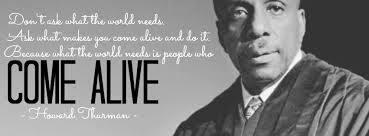 One of the first stories I ever heard R' Zalman tell was this one, about his initial meeting with Howard Thurman. Sara Davidson captures it beautifully in her book, The December Project. Sections of the following are also taken from Reb Zalman's First Steps to a New Jewish Spirit. I wish you Shabbat Shalom and a meaningful encounter at Sinai. See you there. Again. ************************** As a young rabbi in New Bedford, Massachusetts, in 1955, Zalman used to rise at four in the morning to drive to Boston, where he was taking graduate classes on psychology and pastoral couseling. Arriving at Boston University at seven, he needed to davven, but Hillel House was closed. Most buildings on campus were shut except for March Chapel, so he wandered through it, looking for a place to conduct his morning prayers. In one room he found a statue of Jesus, in another a large brass cross on the altar. At length he found a supply room that had no Christian symbols and did his davening there.
A tall black man - Zalman assumed he was the janitor - saw him one morning and asked, "Is there a reason you don't pray in the chapel?" Zalman said it was because of the Christian symbols. "In my guts and heart, it doesn't feel right." "Why don't you look tomorrow morning and see if you'd like to say your prayers there?" the man said. Curious, Zalman entered the chapel the next morning and found the brass cross had been taken off the altar and placed in a corner. He went to the lectern and saw the Bible open to Psalm 139, containing the words: Whither shall I flee from thy presence? If I ascend to heaven, thou art there... Of course, Zalman thought. When he finished davening, he turned the Bible to Psalm 100, a prayer of thanksgiving, then left the chapel and went to his class. In the days that followed, "this man and I were sending messages to each other through the Bible, and I still didn't know who he was," Zalman told me. In the spring, he wanted to take a course listed as "Spiritual Disciplines and resources, with Labs." Labs? What would that be? He requested an appointment with the professor "to see if he was going to try to make a Christian out of me. If he was, I didn't want to take the course." When Zalman walked into the professor's office, he saw the black man he'd assumed was a janitor. It was Howard Thurman, dean of Marsh Chapel, a legendary ecumenical leader who later would be a mentor to Martin Luther King Jr. Thurman offered Zalman a mug of coffee, and Zalman explained his concerns. "I want to take your course, but I don't know if my spiritual anchors are long enough." He put his coffee mug on his desk and began to look at his hands. He turned them palms up, then palms down. The backs of his hands were very dark, and his palms were very light. He turned them back and forth, looking at them, as if considering the light and dark sides of the argument. This lasted for several minutes, but it felt like hours to me. He did what he was doing with such a calm certainty that he seemed to possess great power. Suddenly he spoke, "Don't you trust the Ruach HaKodesh?" I was stunned. He'd used the Hebrew words for the Spirit of Holiness, something I had not expected from a gentile. And in so doing, he brought the question home to me in a particularly strong way. I began to tremble and walked out of his office without answering him. For the next three weeks I went through torment struggling with the question. Did I indeed trust the Ruach haKodesh, trust It enough to have faith in my self-identity as a Jew? Or was I holding back, fearful of testing my belief in an encounter with another religion, unnerved by the prospect of trusting my soul to a non-Jew? If I was fearful, it meant I did not truly believe. Finally I realized that his question could have only one answer. "Don't you trust the Ruach haKodesh?" Dean Thurman had said. I had to say "Yes, I do," and I signed up for his course. .....in the exchanges with Dean Thurman I learned an important lesson, which is still at the center of my thinking: Judaism and all the other Western religions are suffering from having become oververbalized and underexperienced. Someone else's description of ecstasy is not enough. I wanted to have the experience myself, and I'd like to help make it possible for other people to have it too. ****************** Thank you Reb Zalman - you accomplished your task. Have you enjoyed reading my posts? Only a few left to go before R' Zalman's first yahrtzeit. Please consider offering a tax deductible donation to support this project and the work of DC's Jewish Renewal community Minyan Oneg Shabbat. Thank you, R' Mark
1 Comment
|
Mark Novak is a "free-range" rabbi who lives in Washington DC and works, well, just about everywhere. In 2012 he founded Minyan Oneg Shabbat, home to MOSH (Minyan Oneg Shabbat), MindfulMOSH (Jewish mindfulness gathering), and Archives
June 2017
Categories
All
|
 RSS Feed
RSS Feed
